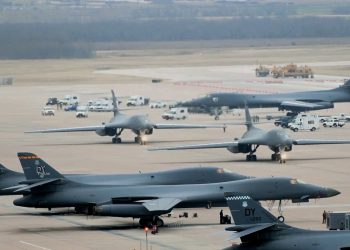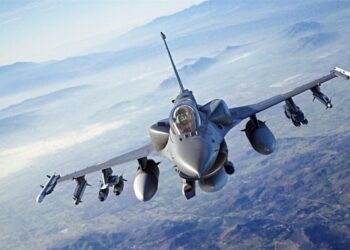US Air Force,
TINKER AIR FORCE BASE: For many Tinker Air Force Base members, retreat signals the end of the workday. For the 76th Maintenance Wing swing and graveyard shifters, it's just the start of their operations.
Swing and graveyard shifters often continue projects started by their daytime counterparts, work tirelessly throughout the night and ensure the warfighter is supported.
“Each and every employee working on the swing shift and graveyard shift is a true professional making a huge impact on our ability to deliver engines and aircraft back to the warfighter in a timely manner,” said Steve Hampton, the 76th MXW swing shift superintendent. “The work our employees provide on swing shift and graveyard shift is key to keeping our production schedules and the continued support of the Air Force mission.”
Swing and graveyard shifters monitor aircraft actions, perform and oversee maintenance production at various shops, and are on-hand should any equipment or machinery malfunction. Hundreds perform these tasks on any given night.
When an aircraft is scheduled to arrive at Tinker AFB, Michael Ward is one of the first to know. As the 76th Aircraft Maintenance Group's Maintenance Operations Center chief, he monitors all aircraft movement, including arrivals and departures, in real-world time. With his staff of approximately 15 people, he can chart an aircraft's purpose at the 76th MXW based on its parking spot.
Mr. Ward said his job is to keep the 76th AMXG informed about aircraft operations, coordinate and communicate with the 552nd Air Control Wing Command Post, and support the local community by passing on necessary information.
“We're the folks that keep all the (proverbial) tentacles in the right places and keep everything where it's organized, so that we can work together as a team,” Mr. Ward said. “We're the 'go-to' people.”
The 76th AMXG Maintenance Operations Center is open 24/7. Performing isolated tasks on aircraft or their parts are aircraft engine inspectors and jet engine mechanics, depainters and painters, sheet metal mechanics, and commodities personnel.
An aircraft engine inspector and jet engine mechanic with the 76th Propulsion Maintenance Group tested a General Electric F101 afterburning turbofan jet engine for a B-1B Lancer Oct. 1. Supposedly, the engine had stalled without reason while out in the field, said William LeRoy, the 76th PMXG aircraft engine inspector.
During his shift, he and Steve Marlett, a 76th PMXG jet engine mechanic, tried to figure out why it stalled by duplicating a similar scenario. While they had trouble recreating the scenario, they found the engine's pressure was low and suspected there was a crack. The engine was later turned over to engineering officials to determine the next steps.
Meanwhile, depainters prepped a B-1B for stripping as other personnel finished stripping a KC-10 Extender of its paint. As part of programmed depot maintenance and major structure repairs, aircraft are depainted before structural work is performed.
James Hunt, a paint worker in the 566th Aircraft Maintenance Squadron corrosion control facility, was one of several who refurbished the interior floorboards of the KC-10.
“My job is important because we support the warfighter,” he said. “It's a big job. We keep the aircraft in the air and safe.”
The KC-10 is a relatively new workload. As of this past January, KC-10s are brought to Tinker AFB to be inspected for corrosion. While at Tinker AFB, the aircraft are stripped of exterior paint, inspected, repaired and repainted. The entire process takes about 30 days. The aircraft Mr. Hunt worked on was the third to come to Tinker AFB.
“We're constantly trying to improve our flow, so we take notes to try and evaluate how we can cut our flow and what we can do to make it better, faster and safer,” said Steve Alexander, the 566th AMXS swing shift section chief.
Also at Tinker AFB, KC-135 Stratofortress aircraft that have been stripped of paint undergo programmed depot maintenance and major structure repairs. More than 200 personnel work on the KC-135s. Programmed depot maintenance is performed every five years and major structure repairs are done when needed.
The job is especially important if Air Force officials intend to fly the aircraft until its retirement date in 2040, said Chris Whitnack, the swing shift production flight chief for the KC-135 in the 564th Aircraft Maintenance Squadron. Both programmed depot maintenance and major structure repairs work ensures longevity.
Yet, if a repair part cannot be purchased due to expense or it is no longer manufactured, the 76th Commodities Maintenance Group machinist shop is nearby. Overseen by George Thomas, the swing shift supervisor, approximately 25 shop workers turn raw-stock fiberglass, aluminum and steel into needed parts.
Among the parts the machinist shop worked on Oct. 1, was the T-38 Talon aileron actuator lever, a flight control. The workload came after two pilots were killed in a recent T-38 crash at Sheppard AFB, Texas. Investigators discovered the lever was a contributing factor. Personnel who repair the aircraft at the Ogden Air Logistics Center, at Hill AFB, Utah, asked for help.
They needed approximately 1,600 left and right aileron actuator levers immediately or senior Air Force officials would consider grounding the entire fleet, which is crucial for pilot training. Ogden ALC officials asked Oklahoma City ALC personnel to manufacture 800 left levers. Warner Robins ALC personnel at Robins AFB, Ga., and Ogden ALC personnel were manufacturing the right levers. Tinker AFB members began manufacturing the order, within a day of receiving the request for help.
If any of the machinery or equipment used to repair aircraft or its parts malfunctions, the 76th Maintenance Support Group is on-call. Managed by Benny Womble, the swing-shift maintenance supervisor, the crew of approximately 15 electricians, mechanics and electronics specialists cater to most any need.
Mr. Womble said repair time usually takes one to two days, but because there are thousands of machines, and oftentimes one specific repair has never been done before, the job is always a challenge.
Like many others who work the swing and graveyard shifts, Mr. Womble said he considers his job a privilege.
“If we're not (fixing) aircraft and engines and sending them out of this building, we're all going to be out of a job,” Mr. Womble said.









